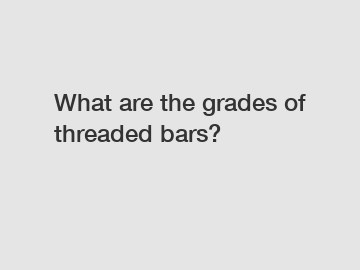What are the grades of threaded bars?
Threaded bars, also known as threaded rods or studs, are commonly used in construction, plumbing, and other industries where a strong and secure connection is needed. These bars are available in a variety of grades, each with its own set of properties and characteristics. Understanding the different grades of threaded bars can help in choosing the right one for a specific application.
**Grades of Threaded Bars**.
Threaded bars are typically made from materials such as carbon steel, stainless steel, or alloy steel. These materials are then subjected to a specific heat treatment process to achieve the desired mechanical properties. The grades of threaded bars are primarily classified based on their tensile strength, yield strength, and other properties.

**Grade 2**.
Grade 2 threaded bars are made from low carbon steel and are most commonly used in general purpose applications where high strength is not required. These bars have a minimum tensile strength of 74,000 psi and a minimum yield strength of 58,000 psi. Grade 2 threaded bars are ideal for applications where moderate strength and good ductility are important.
**Grade 5**.
Grade 5 threaded bars, also known as ASTM A193 Grade B7, are made from alloy steel and are heat treated to achieve a higher tensile strength. These bars have a minimum tensile strength of 125,000 psi and a minimum yield strength of 105,000 psi. Grade 5 threaded bars are commonly used in high pressure and high temperature applications, such as in the oil and gas industry.
**Grade 8**.
Grade 8 threaded bars are made from medium carbon alloy steel and are heat treated to achieve the highest tensile strength among all grades. These bars have a minimum tensile strength of 150,000 psi and a minimum yield strength of 130,000 psi. Grade 8 threaded bars are used in applications where maximum strength and durability are required, such as in structural steel connections.
**Stainless Steel Grades**.
In addition to carbon steel and alloy steel threaded bars, stainless steel threaded bars are also available in different grades. Stainless steel threaded bars are corrosion resistant and are ideal for use in environments where exposure to moisture or chemicals is a concern. Common grades of stainless steel threaded bars include 304 and 316, which offer good corrosion resistance and strength.
**Choosing the Right Grade**.
When selecting a grade of threaded bar for a specific application, it is important to consider factors such as the required strength, corrosion resistance, and environmental conditions. Consulting with a knowledgeable supplier or engineer can help in determining the most suitable grade of threaded bar for a particular project. It is also important to ensure that the threaded bars meet the relevant industry standards and specifications.
In conclusion, threaded bars are available in a range of grades to suit different applications and requirements. Whether it is for general purpose use or high-strength structural connections, there is a grade of threaded bar that can meet the specific needs of a project. Understanding the properties and characteristics of each grade is essential in selecting the right threaded bar for a particular application.
If you have any questions or need assistance in choosing the right grade of threaded bars for your project, please feel free to contact us. Our team of experts is here to help you find the best solution for your threaded bar needs.
For more spherical hex nut, hot rolled rebar for sale, thread bar sourcinginformation, please contact us. We will provide professional answers.

Comments